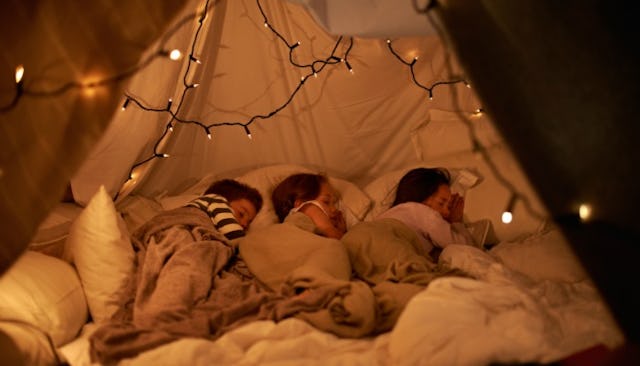Everything Will Be Different

Last night, like every night, I lay reading next to 6-year-old Mari while she drifted off to sleep. The room was quiet but for her white noise machine, and I thought she was nearly asleep—until I heard a sniffle.
“What’s wrong, Mari?”
“It’s Juliet Rose Unicorn.” She extended her arm from beneath the covers, the tattered stuffed animal dangling from her fingers. “Look at her. Look how old and dirty she is! She doesn’t look like she used to.”
“She’s fine, sweetheart. That’s what happens to stuffed animals who are loved. Remember the story of The Velveteen Rabbit? Juliet Rose is becoming real because you’ve loved her for so long.”
“I know that’s not a real story!” Mari tucked Juliet Rose back to her chest and sobbed into the unicorn’s bent horn, furthering its decrepitude.
We recently had a scare with Juliet Rose—we thought we’d lost her for good. She was only hiding beneath a massive pile of blankets (we are fort-builders), but it took us three weeks to realize it (we are not housekeepers). Meanwhile, we convinced ourselves that Juliet Rose had gotten lost someplace from which she could never be retrieved—a highway rest stop, perhaps—and we began to move on from the loss.
But when we finally cleaned up the mess of blankets, there was Juliet Rose, crushed beneath the rubble. Mari was thrilled to rediscover her wayward friend, but her excitement was tempered. She held Juliet Rose in her arms and stared into the rescued creature’s plastic eyeballs, her little forehead wrinkled with worry. She reminded me of a mother with a sick child.
Weeks earlier, I had mentioned in passing to the kids that they would soon need privacy to bathe and get dressed. Ours has always been an unabashedly naked household, but my older son Lucas is approaching puberty, and eventually a little separation will be necessary. Mari cried over my proclamation. Not the part about privacy; that’s not what bothered her. It was the part about Lucas growing up.
“I don’t want my big brother to grow up! I want him to always be with me!”
“Your brother will always be only four years older than you are. He’ll never outgrow you,” I told her.
“But he’ll have his own house one day!”
“Doesn’t he say you can live with him?”
“Yes, but we won’t be here, in this house, with you and daddy. Everything will be different.”
“You can live next door and we’ll build a tunnel between the two houses. How about that?” (Give me a break, okay? I’m winging this thing.)
Mari argued that city codes don’t let you just build random tunnels from one house to another—duh, Mom.
We’d had similar conversations with Lucas when he was Mari’s age and experiencing that same cognitive shift, that slow-breaking epiphany of the transience of everything. I can still remember my own childhood distress as I grappled with ideas of impermanence, loss and mortality, how the weight of those certainties pressed down on me until I couldn’t breathe.
And I know that’s what’s happening with Mari. It’s just now dawning on her how temporary things are, how fragile. But that is the way of things, isn’t it? Remember when our babies first learned object permanence? How sweet it was when our 5-month-old baby realized that when we disappear behind the blankie, we are not really gone? And, conversely, how our heart broke when that same baby realized that when we walk out the front door, we really are gone? It is a daily trauma for them to watch us disappear and reappear, again and again, never knowing when or if we’ll be back. But through this repetitive disappearing and reappearing act, we condition our babies to believe that we will return. We teach them that objects, loved ones, the very lives they live, are permanent. And for a few sweet years, object permanence is an immutable fact.
Until the day it isn’t anymore.
When Mari pulled Juliet Rose from the blanket-fort rubble, she was justifiably startled by the stuffed animal’s decline, unsure what to make of it at the moment. Three weeks of playing and snuggling with newer, cleaner toys in Juliet’s absence had emphasized just how dingy her dear pet had become. But it wasn’t until last night, lying in bed with me while I read, that it fully hit her: One day, Juliet Rose will fall apart. She will become so fatigued from our love that she will disintegrate and slip right through our fingers.
Lucas will grow up and pull away, brother and sister will no longer bathe together without shame, will no longer sleep under a blanket fort with their sweet baby legs tangled around one another. We won’t really be able to build tunnels through the earth so we can get to each other in an instant. Beautiful things end. There isn’t any such thing as object permanence.
Mari cried and cried, alternating between shoving Juliet Rose at me so I could make some feeble attempt at cleaning her and clutching the animal to her chest. I told her to go ahead and sleep with Juliet Rose a few more nights, and in the meantime, I would research a way to clean her without inflicting further damage. Maybe I could even turn back her clock a bit.
As for tonight, we will all climb under a blanket fort, some of us wearing nothing but underwear, but it won’t matter because we’re still innocent enough that the word “impropriety” has no significance yet; and we’ll tell stories about a beautiful little family who lived together forever and ever on the same patch of land, how the family started out in one house but added on building after building, and though those buildings appeared separate to outsiders, what the family knew was that, hidden deep beneath the earth, there was an everlasting, indestructible tunnel that connected them all.
This article was originally published on